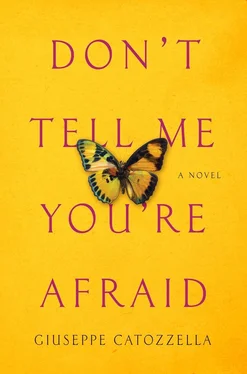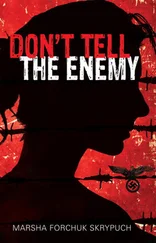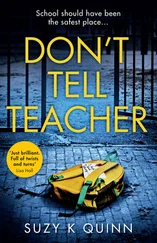It was all over. It was really all over now.
Just as it had come, everything was already behind me.
I had finished last and yet, incredible as it was, after no more than ten minutes I too was engulfed by journalists from around the world. A seventeen-year-old girl, skinny as a rail, who comes from a war-torn country, without a track and without a coach, who fights as hard as she can and comes in last. A perfect story for Western sensibilities, I realized that day. I’d never had such a thought.
I didn’t like it. I told the reporters that I would rather have had people applaud me because I came in first, not last.
But all I got in response was a smile of compassionate tenderness.
I’d show them.
In the locker room, under an ice-cold shower, I swore to myself that I would make it to the London Olympics of 2012, as prepared as Campbell-Brown.
With muscles where they should be and a heart as big and powerful as that of a bull.
In 2012 I would be the winner.
For my country and for me.

WHEN I RETURNED HOME, life became even more difficult.
I received numerous letters, at home and at the Olympic Committee’s headquarters, from Muslim women who had chosen me as a heroine, their ideal. Dozens, hundreds of letters. Each week more arrived. Some written in ink, some typed. Inadvertently I had become a legend for thousands of women who had seen me run without the veils on TVs throughout the world. Those letters from the United Arab Emirates, from Saudi Arabia, from Afghanistan and Iran contained a boundless passion. Hope. Dreams. Faith. In the eyes of the world I had been transformed into a symbol. And it had all happened without my seeking it in the least, without my even having thought of it.
For this same reason, however, going around on the streets had become even more difficult. Rumor had it that the Al-Shabaab fundamentalists hated me. They hated both me and Abdi, but I was a woman and therefore a double threat.
I was forced to wear a burka and cover my face in the country that I had represented, without veils, in front of cameras from around the world.
Luckily there was Hodan, who, from a distance, gave me joy.
We were now able to talk almost every night, and often I even brought Hooyo to Taageere’s bar, where Hodan, who had meanwhile gotten a little webcam, would let us see Mannaar and hear her cooing via Skype. It was true what Hodan and Hooyo said: Mannaar and I were like two peas in a pod. She looked just like me when I was a baby. Hodan laughingly said that Mannaar wanted to become an athlete, just like her aunt.
Meanwhile, I continued training every day with Abdi. As the weeks went by, however, we realized that our performances would never improve. We needed support, a coach, a nutritious diet, a real track that wasn’t riddled by bullets, proper equipment. Nothing like that existed in Mogadishu, and everything became more and more complicated with each passing day, each passing hour.
For a year I never stopped training with Abdi, every day of the week. A year. A whole year spent sweating to improve our times during every free minute we had. Yet they did not improve as they should have, with the speed that we would have expected, especially considering our age. We competed in races in Somalia or in Djibouti, and we even won, but it wasn’t enough.
Something had to change.
At night in bed I prayed to the photo of Mo Farah to let me find a way. I wondered where he was now and what he was doing. We had tried to find a coach in Mogadishu, but no one seemed to be interested. In a country where there’s shooting, no one cares about athletics. The warlords had no reason to sponsor us, and Al-Shabaab’s men wanted us dead, just as they’d killed my father and Abdi’s mother. Even the Olympic Committee lacked the clout and influence to attend to us.
We were lunatics nurturing an absurd folly. That’s what we were. Lunatics whose dream was that of peace, the hope of living together as brothers.
In the end, however, my foolish nightly prayers to Mo Farah were answered, though in a way that was quite different from what I would have expected.
During those months I met an American journalist who often came to Mogadishu to cover sports in West African countries. Her name was Teresa. Teresa Krug.
She came to meet me at the stadium one morning; we did an interview and I immediately liked her. We essentially became friends. She often came back to see me, once a week, more or less.
We talked to the degree that I was able to. In this regard I took after Hooyo: Reticent and introverted, I didn’t like answering questions about things that were too private. The family. Our poverty. My father. My friends. My siblings. My sister who made the Journey. I didn’t feel comfortable with it; I wanted to talk only about running.
In the hours we spent together, Teresa kept telling me that I had talent and that I would have to leave Somalia. She claimed to know a coach in Addis Ababa, in Ethiopia.
One day, during one of our conversations, she asked me if I would like to go and meet him. She had already spoken to him about me. He had seen me race in Beijing and thought there was ample room for improvement in my running.
The more she kept telling me that, the more I knew that it was the only thing to do. If I wanted to continue pursuing my dream, there was no other way. Here I would soon wither away like a wilted leaf.
What she held out, on the other hand, was what I wanted most of all: to have a coach, a normal place where I could train like any other athlete in the world, nutritious meals appropriate for my body, good running shoes, good T-shirts, good shorts. It would have been pure joy.
But I had made a promise to myself and to Aabe many years ago, and I had no intention of breaking it.
Teresa brought up the subject numerous times during those months, and I always said no. She would even help me leave, she said; she would try to facilitate the procedures for my papers.
In spite of this, I held firmly to my position: I would not leave Hooyo, my brothers and sisters, and my country for anything in the world.
One day I would manage to win the Olympics, and I would do it as a Somali and as a Muslim woman.
With my face uncovered and my eyes turned to the sky.
On camera I would tell the whole world what it meant to fight without means in order to achieve liberation.

THEN, shortly before Teresa was to leave Mogadishu to return to the United States, something unexpected happened.
I’d gone out after supper, covered by the burka, to return to the stadium. I still did that every now and then. I didn’t go to train there but to feel the grass beneath my back, to stay and gaze at the stars awhile, to do what I would have liked to do at the beach but wasn’t allowed to: relax, lose myself in the immensity of the sky, let my thoughts fly.
When I got back, Hooyo and my siblings had already gone to bed; the courtyard was silent and deserted. Only the lofty eucalyptus soared, oblivious to everything. Not a breath of air stirred; the tree’s narrow leaves were motionless.
In the middle of the courtyard I noticed a small bundle resting on the ground and went over to it. It was a white hijab folded and tied up at the four corners to form a pouch. How strange. Could Hooyo have forgotten something outside? Yet it seemed to have been put there on purpose, waiting to be found. Right in the center of the big expanse of dusty white earth.
I opened it.
And it knocked the breath out of me.
Читать дальше





![Ally Carter - [Gallagher Girls 01] I'd Tell You I Love You But Then I'd Have to Kill You](/books/262179/ally-carter-gallagher-girls-01-i-d-tell-you-i-lo-thumb.webp)







